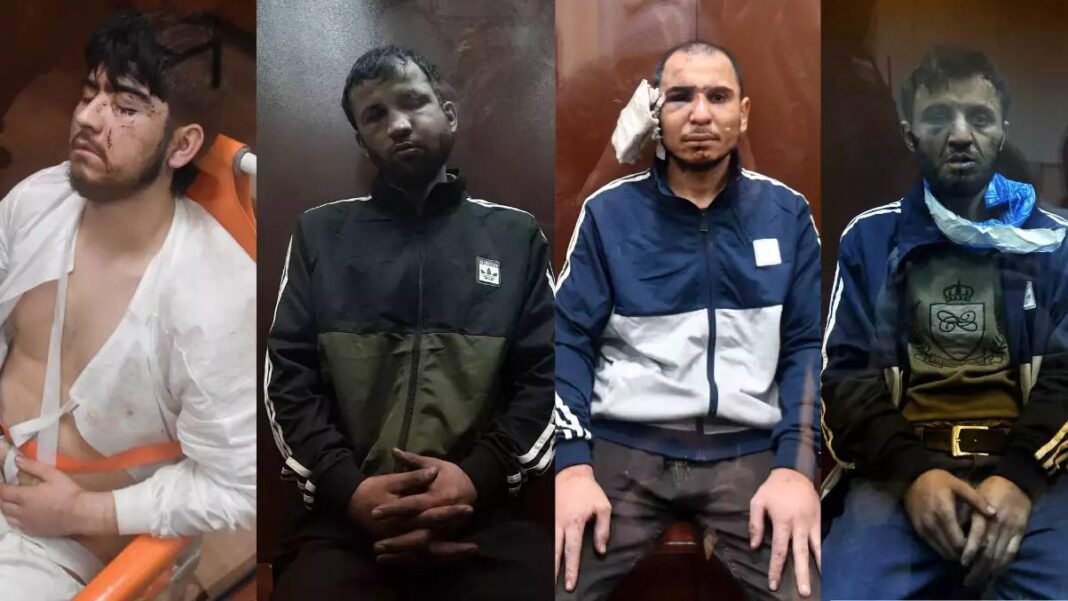Russia has leveled charges against four individuals allegedly involved in the assault on a Moscow concert hall, resulting in the deaths of at least 137 individuals.
In a court session held in Moscow, three of the accused were escorted in, while the fourth was in a wheelchair. They were officially accused of committing an act of terrorism.
The Islamic State group (IS) claimed responsibility for the attack at Crocus City Hall, providing video evidence to support their claim.
Russian authorities, however, have asserted, without substantiation, Ukrainian involvement. Kyiv has denounced this assertion as “absurd.”
The four suspects were identified by Russian authorities as Dalerdzhon Mirzoyev, Saidakrami Murodali Rachabalizoda, Shamsidin Fariduni, and Muhammadsobir Fayzov.
Video footage depicted three of them being escorted by masked police into the Basmanny district court in Moscow. Reports suggest they had undergone severe beatings and interrogation, possibly including electric shocks.
Two of the men, identified as Mirzoyev and Rachabalizoda, exhibited signs of physical trauma, including black eyes and injuries to the ear. Fariduni’s face was visibly swollen, and Fayzov appeared to have lost consciousness, wearing a hospital gown and missing an eye.
During their court appearance, all four were confined in a glass booth and closely monitored by masked police.
According to a statement on the Telegram messaging service attributed to the court, Mirzoyev confessed to his involvement, while Rachabalizoda also admitted guilt.
The suspects are reported to be citizens of Tajikistan, as per Russia’s state news agency.
They are to remain in pre-trial detention until at least May 22, as per the court’s decision.
The attack occurred on Friday night when four gunmen stormed the Crocus City Hall in Krasnogorsk, a suburb north of Moscow, during a rock concert attended by approximately 6,000 people. The assailants opened fire on the crowd, set fires, and caused the venue’s roof to collapse.
Russian authorities confirmed over 137 fatalities and over 100 injuries.
The suspects were apprehended in the Bryansk region around 14 hours after the attack, according to Russia’s Federal Security Service (FSB). Bryansk is situated approximately 400km (250 miles) southwest of Moscow.
While IS has claimed responsibility for the attack and released footage of the gunmen inside the concert hall, no Russian official has acknowledged this claim. Instead, they have insinuated, without evidence, Ukrainian involvement, suggesting that Ukraine facilitated the attackers’ escape across the border.
Ukraine’s President, Volodymyr Zelensky, rebuffed these allegations, stating that it was implausible for the suspects to traverse a heavily guarded and mined border into Ukrainian territory.
The United States, through Adrienne Watson, a spokesperson for the national security council, placed sole responsibility on IS for the attack, dismissing any Ukrainian involvement.
In addition to the four main suspects, seven others have been detained in Russia on suspicion of aiding the attackers.
The United States had previously warned Russia of potential attacks targeting large gatherings earlier this month, issuing a public advisory to its citizens in the country. However, the Kremlin dismissed these alerts as propaganda aimed at interfering with its presidential election.
Following the attack, Washington reiterated its stance, stating it had no reason to doubt IS’s claim.
This incident marks another instance of IS targeting Russia or its interests abroad. Previously, the group claimed responsibility for the bombing of a Russian plane over Egypt in 2015, resulting in 224 casualties, primarily Russian citizens. It also claimed a 2017 bomb attack on the St. Petersburg metro, which claimed 15 lives.
Security analysts suggest that IS views Russia as a prime target due to various factors, including Russia’s military involvement in Syria, its history of conflicts in Muslim-majority regions such as Chechnya, and its past engagement in Afghanistan.
IS-Khorasan Province (IS-K) operates primarily in Afghanistan and parts of Central Asia, frequently criticizing President Vladimir Putin in its propaganda.




